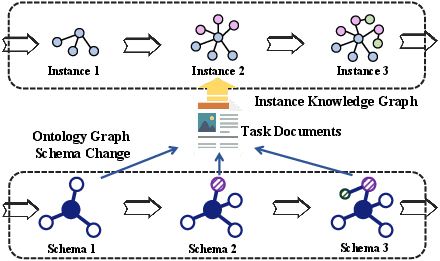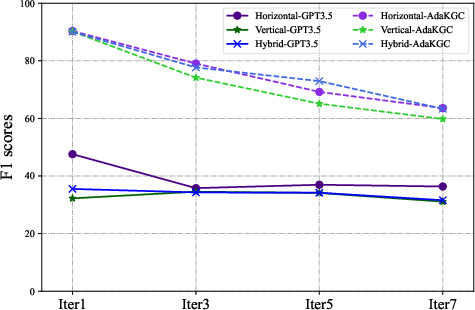- The paper introduces AdaKGC, a novel method for schema-adaptable KGC that dynamically extracts knowledge without retraining.
- It leverages schema-enriched prefix instructors and dynamic decoding to manage horizontal, vertical, and hybrid schema expansions.
- Empirical results highlight AdaKGC’s improved performance over models like GPT-3.5, with room for further enhancements.
Schema-adaptable Knowledge Graph Construction
The paper "Schema-adaptable Knowledge Graph Construction" (arXiv ID: (2305.08703)) presents a novel task aiming to address the limitations of conventional Knowledge Graph Construction (KGC) approaches, which are often static and unable to cope with evolving schema. This work introduces the concept of schema-adaptable KGC, which dynamically extracts entities, relations, and events based on a changing schema without requiring retraining. The proposed method is substantiated by a new benchmark and a baseline model called AdaKGC, showcasing the potential for practical applications in dynamically evolving knowledge domains.
Introduction to Schema-adaptable KGC
Conventional KGC techniques typically rely on static schemas with predefined classes. They often face challenges when dealing with dynamic scenarios where schemas evolve, necessitating new methodologies that can proactively adapt to schema changes. The schema-adaptable KGC task is designed to continuously extract knowledge instances following an evolving schema graph, without retraining models every time the schema updates. This is particularly relevant in domains where knowledge is rapidly expanding and traditional methods fall short.

Figure 1: Knowledge Graph Construction (KGC) with dynamic updates of schema.
Methodological Framework
Dataset and Model
The paper constructs benchmarks by splitting existing datasets along three evolutionary directions: horizontal, vertical, and hybrid schema expansions. Horizontal expansion involves adding new class nodes at the same hierarchical level, vertical expansion introduces subclasses, and hybrid expansion combines both strategies.
The authors introduce AdaKGC, a model containing schema-enriched prefix instructors and schema-conditioned dynamic decoding strategies. AdaKGC leverages a pre-trained encoder-decoder model (T5) with schema-enhanced modules to achieve adaptability towards schema evolution.

Figure 2: The overview of ADAptive Knowledge Graph Construction AdaKGC.
Experimental Evaluation
The effectiveness of AdaKGC is evaluated across various benchmarks against models like Text2Event, TANL, UIE, and GPT-3.5. The results demonstrate that existing models struggle with complex evolving schemas, while AdaKGC shows improved performance. However, the paper also highlights that these improvements have room for further enhancement. Notably, AdaKGC benefits from schema-enriched components, which help maintain the integrity of extraction across schema updates.

Figure 3: GPT-3.5 results on schema expansion dataset.
Implications and Future Directions
The work on schema-adaptable KGC has significant implications for the evolution of information extraction methodologies in AI. By allowing systems to adapt to changing schema without retraining, it provides a more flexible and efficient approach suitable for rapidly evolving domains.
Future research directions may include integrating large-scale LLMs more deeply, given their promising initial performance. Additionally, there is potential for further refinement of schema adaptation techniques to enhance generalization capabilities and reduce performance degradation over time. This task also opens avenues for exploring the integration of multimodal data, enhancing the richness of constructed knowledge graphs.
Conclusion
The paper makes a valuable contribution to the domain of KGC by introducing the schema-adaptable task and the AdaKGC baseline. It successfully identifies the challenges existing models face with dynamic schemas and proposes innovative methods to address these. While initial results are promising, the research highlights the need for continued exploration in schema adaptation capabilities and the potential integration of advanced LLMs to improve the robustness and applicability of KGC systems.




